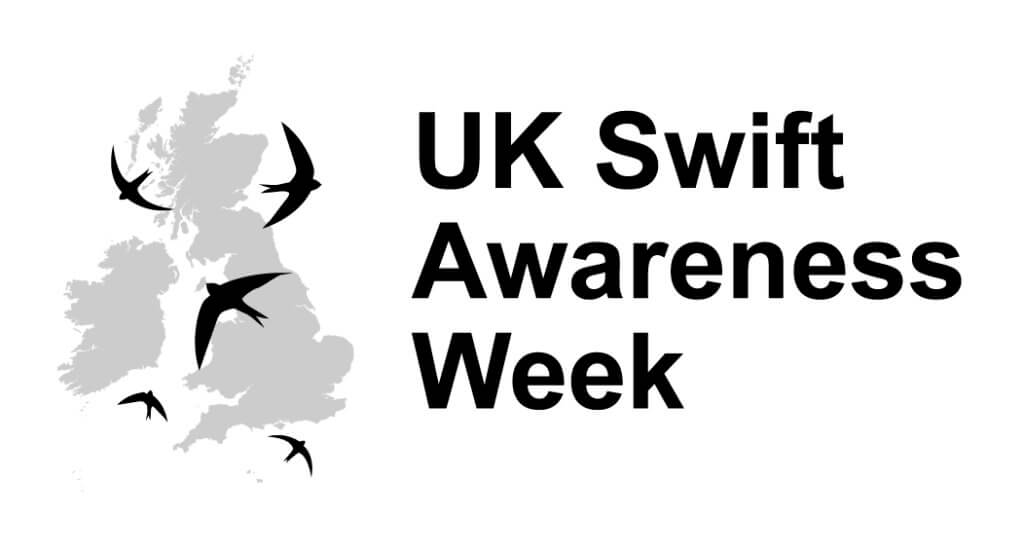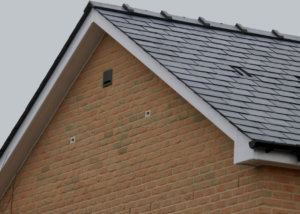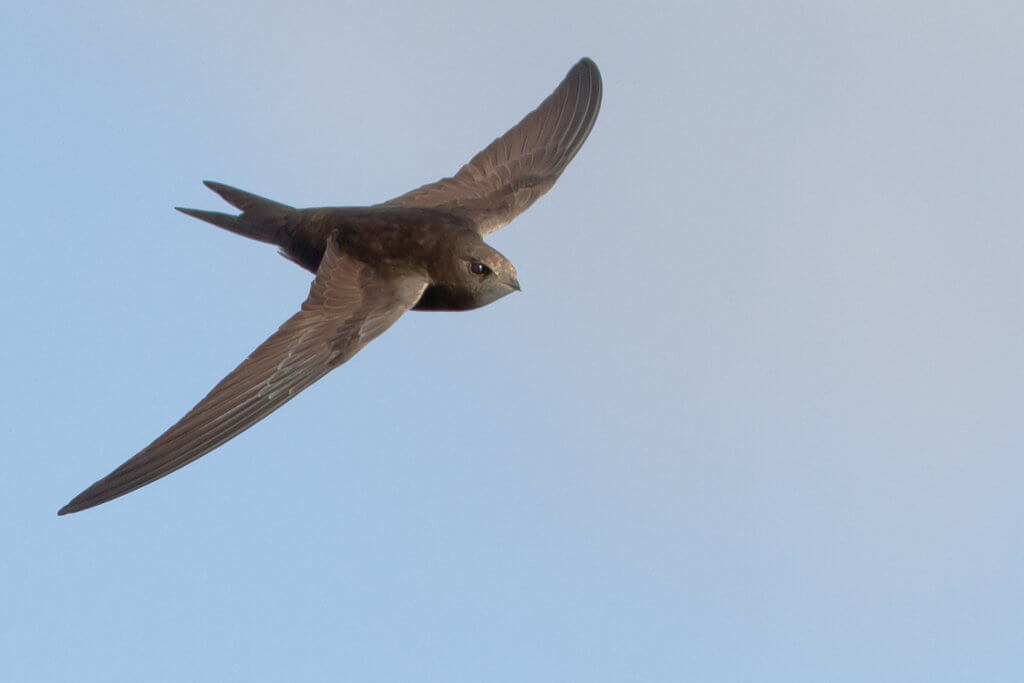 Lifetime bird watcher and over 60 years an RSPB member, Dick Newell, retired from the software industry, now devotes time to devising ways to help Swifts, which led recently to the BTO giving a Marsh Award for Innovative Ornithology to Action for Swifts.
Lifetime bird watcher and over 60 years an RSPB member, Dick Newell, retired from the software industry, now devotes time to devising ways to help Swifts, which led recently to the BTO giving a Marsh Award for Innovative Ornithology to Action for Swifts.
UK Swift Awareness Week 16th-23rd June, 2018
This blogpost is about publicising Swift Awareness Week which will be taking place across the UK and in Ireland in June.

One may well ask, why do we need a Swift Awareness Week?
The recent 2017 Breeding Bird Survey report shows that, by 2016, Swifts in the UK declined by 53% since 1995 and by 39% since 2006. 39% in 10 years equates to an average annual decline of 4.8%.
In a previous guest blog post, I lamented the lack of any legal protection for Swift nest sites outside the breeding season. Because bats and newts do have such legal protection, every environmental consultant is aware of them and takes the time and trouble to search for them to include in their environmental impact assessments. It is not so with Swifts.
It can cost a lot of money to accommodate bats or newts, but making provision for Swifts costs very little.
Some level of legal protection is available, provided the local planning authority knows there are swifts breeding in properties to be renovated. They then have the option of imposing a condition to preserve existing access to nest sites, or to provide mitigation in the form of requiring new nest sites. Whether such instructions are carried out competently (or even at all) is rarely monitored.
We will use an anecdote to illustrate the consequences of a general lack of awareness of Swifts. Fortunately a local person was very aware:
She alerted us to a situation where a garage was about to be demolished while there was still a pair of Swifts feeding a nestling in the roof. The garage was to be removed to make way for a new development of 4 houses. While we could have played hard ball and insisted that the project was halted, we did not do this. Confronted with a large steel ball hanging from a crane, we instead took the pragmatic (though possibly illegal) approach, of removing the nestling for fostering by rehab specialist Judith Wakelam. It was successfully released 2 weeks later.
The company hired to assess the environmental impact detected 1 bat leaving the garage, but the survey did not reveal the presence of Swifts. The recommendations included provision of bat boxes and bird [sic] boxes. One supposes a few tit boxes scattered around might make people feel good, but it would not do a whole lot for local biodiversity,
The 4 houses provide 5 suitable gables for Swift boxes, and, with the help of an enlightened developer, 10 internal swift boxes have been installed – a good end result.
This is but one small example of a house builder doing the right thing. Some major house builders like Barratt Homes and the Duchy of Cornwall are committed to incorporating large numbers of internal Swift boxes in their new developments.
Swifts, have a population half life of 20 years. We are not going to get any changes in the law, so a grassroots campaign is needed to raise awareness instead.
It is this thought that has inspired UK Swift Awareness Week 2018 – a nationwide campaign to hold events in the week of June 16th-23rd.
The Swifts Local Network, an association of more than 80 groups and individuals around the country is mobilising its members to hold Swift parties, Swift walks, Swift workshops, Swift displays, indeed any activity to get Swifts into the public consciousness.
 We would also hope that some of this will brush off onto environmental consultants, local government planners and the building industry. Imagine a box or 2 in every new gable in the country.
We would also hope that some of this will brush off onto environmental consultants, local government planners and the building industry. Imagine a box or 2 in every new gable in the country.
Left: 2 Swift entrances and a bat box in a gable. Photo Judith Wakelam
Read more about 2018 UKSAW
You can find an event near you on this Google map
For further information, please contact Nick Brown/Peta Sams on [email protected]
Swifts Local Network if you are interested in helping to conserve swifts, do consider joining the Swifts Local Network by emailing [email protected]

I applaud an aware day for any declining species but sadly there aren’t enough days in a year to cover all eligible candidates.
Decline in biodiversity is a sad state of affairs and one whilst we (readers of this blog or maybe I should say the majority of blog readers) try our best to address it needs those in power to act for planet not private profit?
My local council are/ have been re-roofing many/ all of their residential properties. I never thought of doing it before the work began but since the work on many houses has been completed I’ve observed many swifts trying to enter what must have been access points to nesting sites only to the thwarted by the presence of new, impenetrable plastic fascia boards which now block access to their nesting sites.
Which council is it? If you contact us through our website maybe we can assist: http://www.islingtonswifts.wordpress.com
I can testify that having swifts nesting in your eaves is good for human health and well being. Sitting outside having a barby with swifts screaming just over your head is a lovely experience 🙂
I have the same problem as Anthony – my local council (Wrexham) is changing roofs on all council properties in the area – so many swifts were left confused and homeless, trying in vain to enter the nests they probably used for years…I actually installed a nest box for them on the wall (sadly it’s sticking out a bit, but hopefully swifts won’t mind) but I’m unsure whether it will be any good and, because of all the builders, swifts didn’t occupy it this year.
I wonder if you could assist? Maybe with your help, council would do something to help swifts come back?
Really sorry to hear what is happening in Wrexham. Have you informed the Council that there are Swifts nesting on the houses that are being re-roofed? It’s against the law to disturb nesting birds but if renovations take place whilst the Swifts are out of the country there is no offence. However, Council’s have a duty to conserve species in their area and they should be providing some alternative solutions for the Swifts. I urge you to contact the Council, your Local Councillor and see if the Council have a Biodiversity Officer. Could also be worth contacting your Local Biological Record Centre or Ecology Unit. If Swifts have already started nesting then it should be reported to the Police – Wildlife Crime Officer. I’m not sure if there is a Swift group local to you but you could also get advice from your Local RSPB office. Best of Luck Bolton & Bury Swifts
Do all we can please. I run Huntly Swift Group and as said here providing for swifts takes very little expense or difficulty just some care and thought and awareness. i couldnt tell you how many of the people i have spoken to about swifts havent got any idea that they are any different to swallows and house martins. it is quite unbelievable really. Losing whole colonies like mentioned by Anthony B is a complete disaster for swifts, hopefully the issue can be resolved quickly or they will certainly be lost.
Really sorry to hear what is happening in Wrexham. Have you informed the Council that there are Swifts nesting on the houses that are being re-roofed? It’s against the law to disturb nesting birds but if renovations take place whilst the Swifts are out of the country there is no offence. However, Council’s have a duty to conserve species in their area and they should be providing some alternative solutions for the Swifts. I urge you to contact the Council, your Local Councillor and see if the Council have a Biodiversity Officer. Could also be worth contacting your Local Biological Record Centre or Ecology Unit. If Swifts have already started nesting then it should be reported to the Police – Wildlife Crime Officer. I’m not sure if there is a Swift group local to you but you could also get advice from your Local RSPB office. Best of Luck Bolton & Bury Swifts